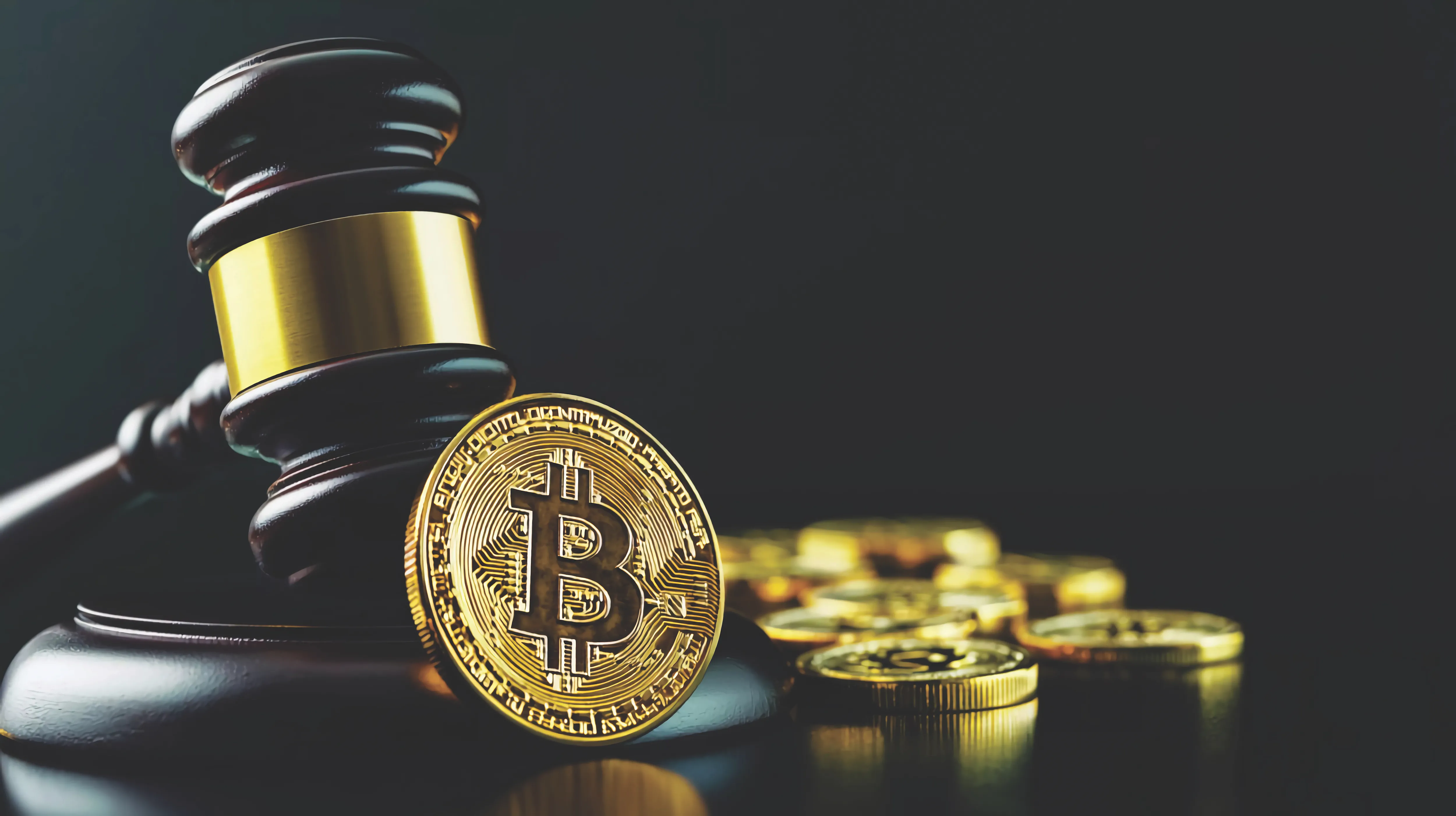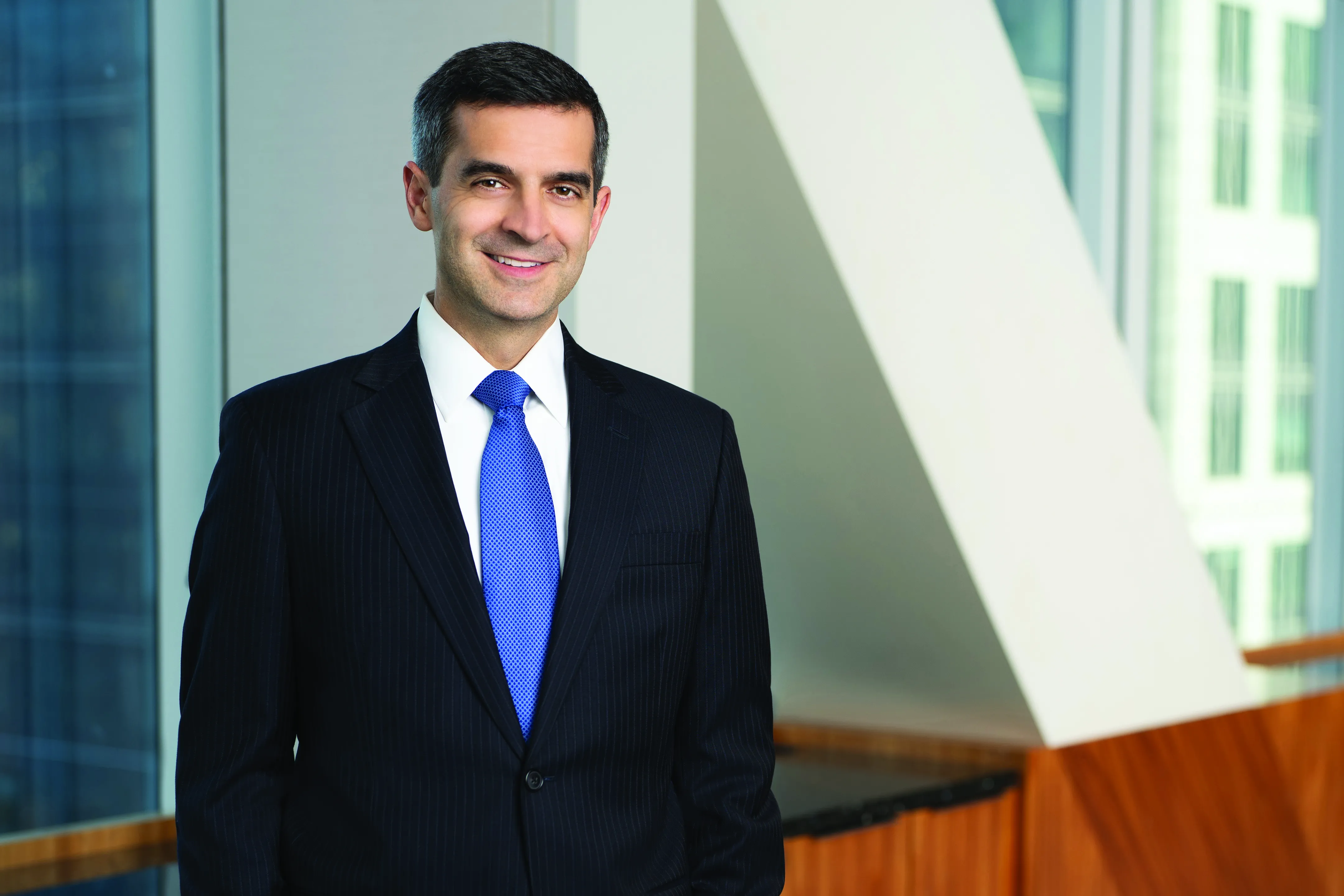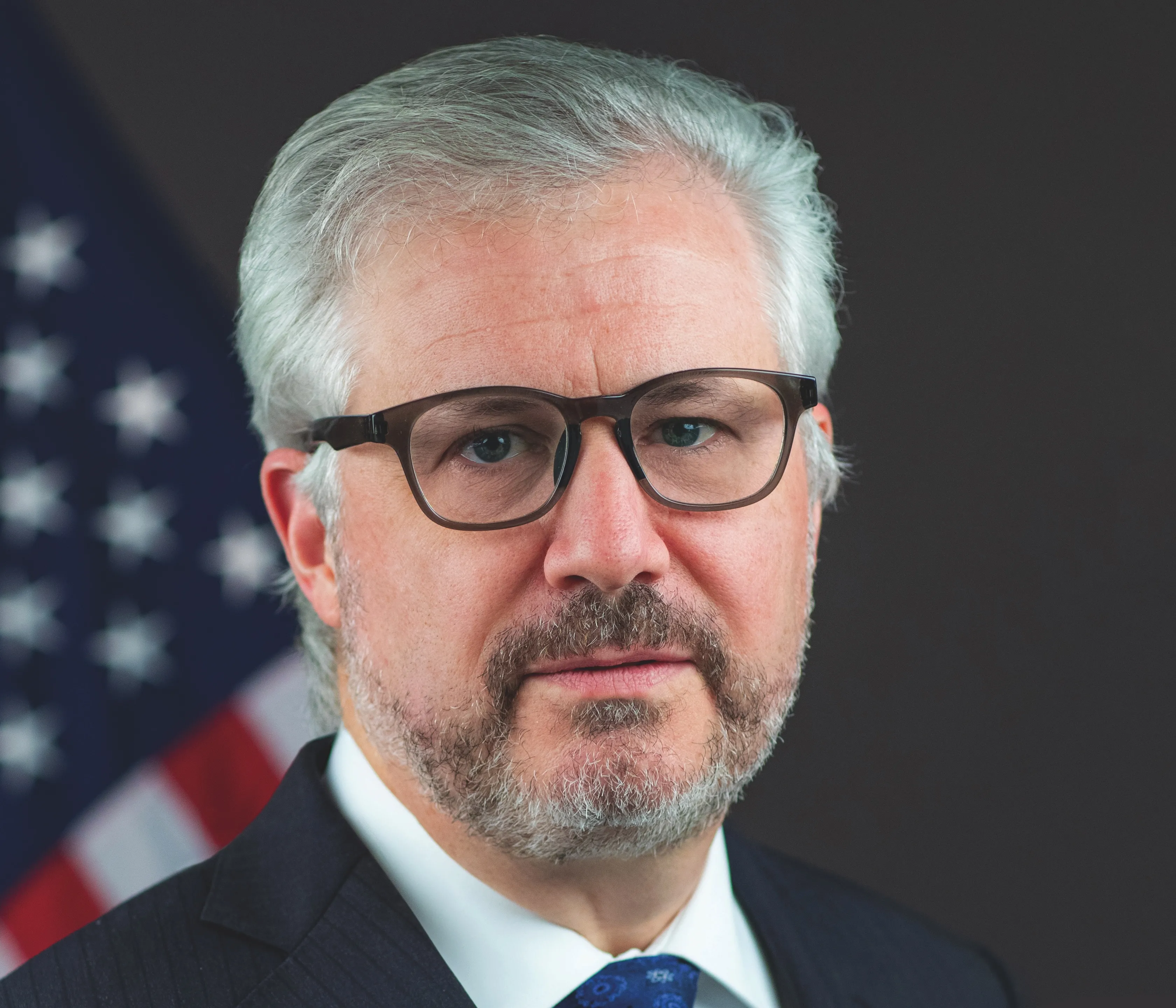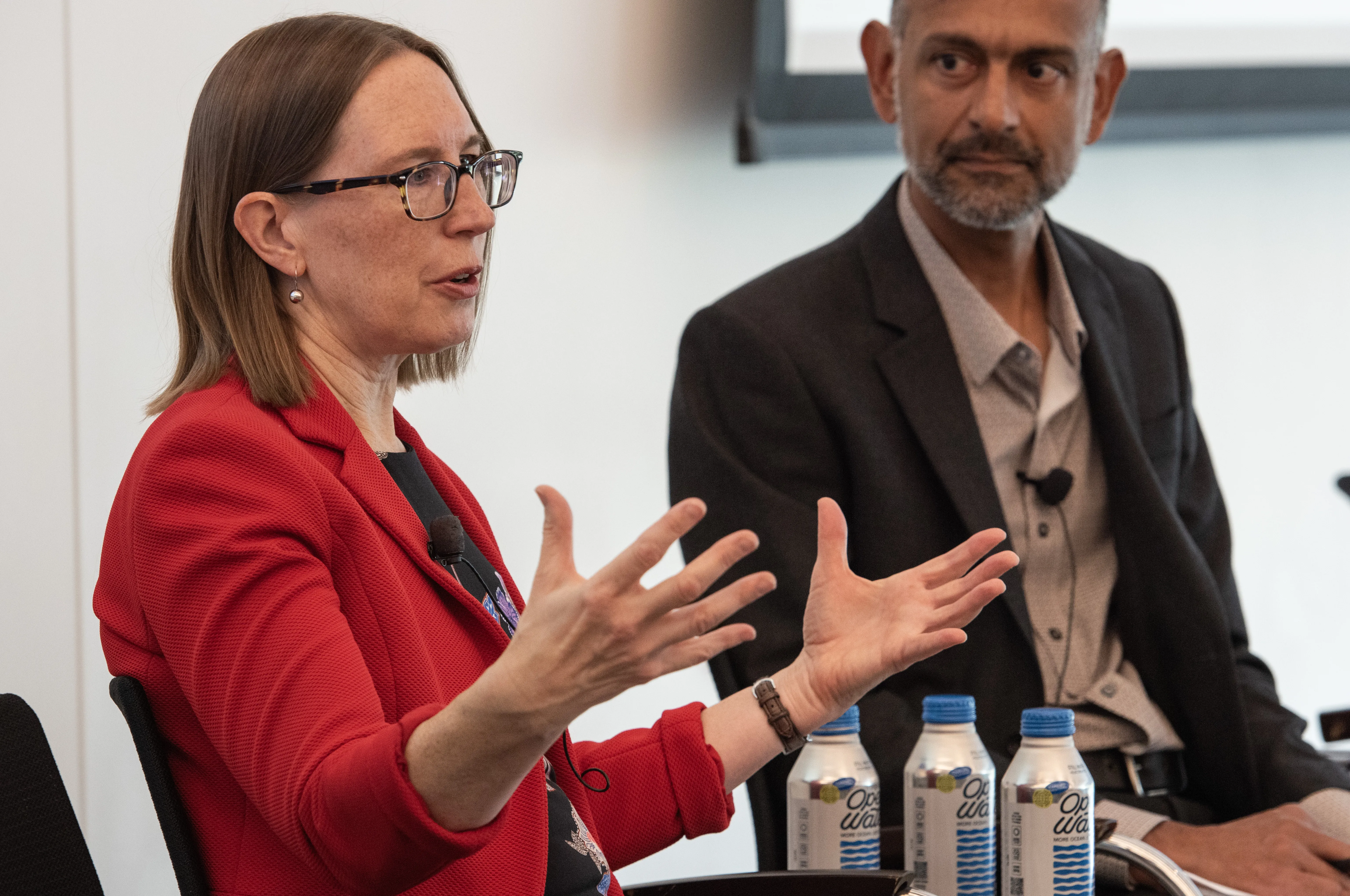Counselors of Crypto

Paul Grewal, ’96, was serving as a federal magistrate judge in northern California when he first heard of cryptocurrency in 2011. The US government was conducting a criminal investigation, sought to seize an asset called bitcoin, and needed court approval to do so.
“While it is quite common for a federal magistrate judge to be presented with a seizure request, it was, to my knowledge, the first time that any court had been asked for a seizure warrant of that type,” Grewal recalled. “In reviewing that application, I remember clearly that I had never heard of bitcoin and knew nothing of its origin or what it did or why one might want to hold it. So I educated myself as part of my review of the application and was quite intrigued.”
His interest in this new form of currency—or whatever it was—remained casual throughout his remaining five years on the bench, and then grew more serious during his subsequent four years as vice president and deputy general counsel at Facebook.
Then, in 2020, Grewal had an opportunity to shift his fanciful interest in cryptocurrency into something serious. Coinbase, an eight-year-old company that had emerged as the nation’s biggest cryptocurrency exchange and the world’s largest custodian of bitcoins, approached him about becoming the company’s new chief legal officer.
If he took the job, he knew the challenges would be formidable. At the time, Fortune magazine noted that a “messy legal and regulatory environment” surrounded cryptocurrency and that it “has seen Coinbase mired in IRS investigations and class action lawsuits.”
Grewal saw the legal issues as an opportunity. “I thought, ‘You know what? I’m intrigued by the technology.’ It’s very much in line with how I’d spent my entire career since leaving the University of Chicago. More than that, I had a very strong feeling— even a Spidey sense—that the legal issues that were quickly emerging in cryptocurrency were going to be seminal. So, I decided to jump in.”
Crypto: A Brief History
Back in the 1980s, not many people took cryptocurrency seriously. Computer scientist David Chaum (known today as the “godfather of crypto”) had gotten the ball rolling in the early part of the decade, when he developed the concept of digital cash. The idea that people could conduct financial transactions without needing a central intermediary, such as a bank, was revolutionary and groundbreaking. But it would take more than two decades for cryptocurrency, the manifestation of Chaum’s concept, to take root.
While digital payment systems like PayPal emerged for online transactions in the 1990s, they all still required a central authority to coordinate them. It wasn’t until 2008, with the publication of a paper titled “Bitcoin: A Peer-to-Peer Electronic Cash System,” by an anonymous author using the name Sakoshi Nakamoto, that a working cryptocurrency system without any bank intermediaries, utilizing a digital peer-to-peer network called a blockchain, was finally laid out. Early the following year, Nakamoto launched bitcoin, the world’s first working cryptocurrency.
I had a very strong feeling—even a Spidey sense— that the legal issues that were quickly emerging in cryptocurrency were going to be seminal. So, I decided to jump in.” Paul Grewal, '96

Since then, crypto has taken a wild ride. Initially valued at a few cents and a few dollars, bitcoins drew the attention of tech enthusiasts and libertarians. But they also caught the eyes of bad actors who turned to bitcoins to launder money. This activity, in turn, caught the attention of regulators. As awareness grew, so did crypto’s value. Early investors made financial killings, prompting assessments that crypto was little more than a glorified Ponzi scheme—especially when the market plummeted, as it has done at least twice. Still, crypto abides, and has evolved from an experimental digital currency into something broader with the potential to change the way the world works.
Crypto and the Law
If numbers are any indication, it appears that Grewal may have made a wise choice. Crypto’s popularity, as well as its overall market value, have skyrocketed, especially since the entrance of the pro-crypto Trump administration, but it is an industry with many legal challenges.
While many people think of crypto as akin to an investment security, widespread acceptance as a currency could revolutionize financial systems by providing banking access to anyone with a phone or internet connection. It could facilitate “smart contracts” that will allow parties to transact directly without needing to trust each other or rely on a third party. As some zealots contend, crypto—bitcoins, in particular—could replace gold as a reliable store of value.
Still, it can be a challenge for lawyers— or anyone—working in this area to explain why crypto is so important. Commercial litigator Kate Roin, ’10, who teaches a class called Blockchain, Cryptocurrency, and the Law at the Law School, says that even her presumably tech-savvy Gen Z students don’t understand it at first.
Roin says that she starts with the technology, explaining how blockchain works as a replacement for the trusted intermediaries in traditional financial systems. (A blockchain is a digital ledger that records transactions across many computers in a way that prevents alteration.) The class then moves on to other areas, including what the current legal and regulatory landscape looks like now and how it might change. That last part—how the legal and regulatory landscape might change—has been a lively topic this year, as the Trump administration has clearly signaled its support for crypto.
“I’m not tied into DC, as a regulatory lawyer would be, but it’s a complete change,” said Roin, a partner at Bartlit Beck in Chicago. “I had conversations with very well-known GCs in the crypto world a year ago, and everyone thought litigation and the courts were going to be deciding the fate of crypto in America. But we went from a regulation-by- enforcement-action landscape to a total, 180-degree pivot in January. All of the Securities and Exchange Commission’s (SEC) enforcement actions—against Coinbase, Uniswap, Binance—have been dropped. And now it looks like we’re likely to see legislation come through, and from there, a regulatory landscape the industry can move forward with.”
A New Crypto Landscape
It is certainly clear that the Trump administration has ushered in a new era of crypto acceptability. Of course, the president has his own stake in crypto, with involvement in at least four ventures (which Forbes estimated made $1 billion for the Trump family by mid-2025).
But the administration is also taking steps to broaden the use of crypto- currencies by the public. In June of this year, the Federal Housing Finance Agency issued a directive ordering Fannie Mae and Freddie Mac to formally consider cryptocurrency as an asset in single-family mortgage loan risk assessments. States are taking initial steps, too. In 2024, the California Department of Motor Vehicles an- nounced that it was digitizing 42 million vehicle titles on a blockchain to better facilitate transfers and deter lien fraud. The larger question, though, is how Congress and the Securities Exchange Commission will decide to regulate the crypto industry.

"Everyone thought litigation and the courts were going to be deciding the fate of crypto in America. But we went from a regulation-by-enforcement-
action landscape to a total, 180-degree pivot in January.” Kate Roin, '10
Louisiana State University Law Professor Del Wright, ’96, believes that crypto will rapidly become mainstream now that the Senate’s GENIUS Act or the House’s STABLE Act have gained Trump’s signature. Those bills cover stablecoins, which are digital currencies that are pegged one to one to the value of a fiat currency like the US dollar. This makes them more stable than digital currencies, like bitcoin, which are subject to price volatility.
“If you look at who the big money players were who gave to the potential elected officials, you’ll see that it wasn’t decentralized finance,” Wright said. “It was centralized finance. This means that they’re coming in.”
While the allure of cryptocurrency has been largely as an investment that might pay off big, stablecoins would give people a new sort of reliable currency with attractive benefits.
“If you look at who the big money players were who gave to the potential elected officials, you’ll see that it wasn’t decentralized finance. It was centralized finance. This means that they’re coming in.” Del Wright, ’96

“It’s great if you can just send dollars digitally to anyone in the world that has a cell phone,” Wright said. “Think of how much simpler things will be to say, ‘OK, let’s just do this in stables and we’ll be done.’ If I need to give you two dollars, I don’t need to have Cash App take any hidden fees. There’s a direct transfer, and the fee to do that is zero cents.”
In addition to the GENIUS and STABLE bills, Congress appears likely to pass the Digital Asset Market Clarity Act of 2025, which aspires to establish a regulatory framework for a digital-asset market structure. It would direct the SEC and the Commodity Futures Trading Commission (CFTC) to draw up regulations to implement that framework. The SEC, meanwhile, began its own review of potential regulatory changes one day after Trump’s inauguration.
For nearly 80 years, the SEC has used a measure called the Howey Test (established by the 1946 US Supreme Court case SEC v. W. J. Howey Co.) to determine whether a transaction qualifies as an “investment contract” under the Securities Act of 1933 and therefore is subject to SEC regulations. That case, however, came about in the predigital world, and the commodity in question was citrus fruit in Florida.
The looming question today is whether a crypto coin or token should be considered a security or a commodity. The SEC has generally considered digital assets like crypto coins and tokens to be securities under the Howey Test criteria for assets to qualify as “investment contracts.” If cryptocurrency is deemed a commodity like gold or oil, however, it falls under the purview of the CFTC. Making the decision-making task more challenging is the fact that cryptocurrencies may have characteristics of both. For instance, bitcoins probably look like securities because people are investing in them, but they exist within a blockchain that may more closely resemble a commodity.
“Until January, the SEC generally viewed most digital assets as securities, specifically as ‘investment contracts.’ But now it’s rethinking a lot of that.” Bill Martin, ’05

I think what the SEC is trying to do is think about what rules and guidance make the most sense for this new technology,” said Bill Martin, ’05, counsel at O’Melveny & Myers in New York and a former SEC lawyer. “Until January, the SEC generally viewed most digital assets as securities, specifically as ‘investment contracts.’ But now it’s rethinking a lot of that. There may be some digital assets that are appropriately viewed as securities, but a lot of them might not be.”
Meanwhile, Richard Gabbert, ’04— who is chief of staff for the SEC’s Crypto Task Force—reports that the body has conducted numerous roundtables with various interested parties and has been collecting comments on its website.
As he describes it, the task of assigning agency responsibility often comes down to hairsplitting. A security that is issued in the form of a crypto token is still a security, but Gabbert pointed out that determinations might get murkier.

“The task of assigning agency responsibility often comes down to hairsplitting. A security that is issued in the form of a crypto token is still a security, but those determinations might get murkier.” Richard Gabbert, ’04
“For example, if I am offering a token to raise funds and making promises to you about building a blockchain network on which you can use these tokens, or that has features that might generate returns for you, and you expect the value of these tokens to increase because of my efforts in building the blockchain network, then these transactions may be a security. But once I’m done building that blockchain network five years from now, when you sell that token to somebody else and there are no promises attached to it, it may not be a security,” he said.
One of the main questions attracting attention from lawyers and regulators is how decentralized finance (DeFi), a growing area within the crypto and blockchain space, should be regulated. DeFi aspires to recreate traditional financial services in these decentralized networks, which are devoid of interme- diaries like banks. The problem is that DeFi’s decentralized and autonomous nature makes it difficult to identify responsible parties for compliance, raising the risk of malicious activity by cybercriminals and hackers.
Wright, the LSU law professor, pointed out another potential issue with DeFi: To what degree are “smart contracts” on DeFi networks free speech? Smart contracts are self-executing agreements written in code and used to automate and enforce financial transactions, eliminating the need for banks or brokers. “I think there’s a huge issue in the constitutionality of whether you can be liable for writing code,” he said. “Let’s say I write some general-purpose code that North Korean hackers figured out is really good for their use as a hacker. Could I be liable for writing that code or is code speech? How much do freedom-of-speech rights come with writing code?”
In February, the SEC announced it was dropping its two-year-old lawsuit against Coinbase, which alleged that the company was an unregistered exchange that sold unregistered securities. The messy legal and regula- tory environment of the crypto world that Grewal entered five years ago has become less messy, and that has changed the focus of his job. “I was spending a lot of time in court- rooms, making our case and defending the unwarranted charges, in our view, that were brought by the SEC,” he said. “Now I get to focus much more on building the future.”
As Grewal spoke, in June, the value of a bitcoin had reached its highest point in history, at more than $100,000. Bitcoin had come to dominate the crypto asset market, claiming 60 percent of total market share. Part of the attraction, no doubt, is the security of bitcoins’ block- chain, which has never been hacked, and part of it is its comparison to gold as a reliable store of value.
Digital Gold?
Whether crypto’s “digital gold” label is warranted remains to be seen. But its foothold in the world appears to be ever more secure. Some companies are already using blockchains for supply- chain management, and some see a future use for healthcare data manage- ment, digital identity verification, and voting systems.
“It’s time for the technology to shine,” Grewal said. “It’s time for the people with great product ideas to get those products out there and see crypto do more than just get traded as asset. We want to see it actually underline an entirely new wave and phase of innovation—and we think it will when it’s given the chance.”


Other Looming Issues
Private Litigation
Bill Martin, ’05, of counsel at O’Melveny & Myers, thinks private litigation could increase: “There’s a concern that as federal regulators pull back, there may be more private lawsuits from investors or purchasers of cryptocurrency who believe they have claims because they have suffered losses.”
State–Federal Splits
This is another area that could spawn plenty of lawsuits. “You’ve got a few state AGs essentially carrying the Gensler torch forward, but under their own state laws,” said Nick Harper, ’15, a partner at Gibson Dunn in Washington, DC, referring to former SEC Chairman Gary Gensler, a Biden appointee who favored robust enforcement of the crypto industry with existing securities laws. “That’s an area where there’s going to be, and already is, litigation. There’s also a question about to what extent, if at all, the market-structure (Clarity) bill will preempt states from doing that. That’s an area, too, where there’s probably going to be a lot of litigation.”
Taxation
According to Paul Grewal, ’96, chief legal officer at Coinbase: “There are important issues regarding the extent to which cryptocurrency transactions can trigger the application of federal income-tax laws. Questions like ‘What does it mean to realize gain when a cryptocurrency asset appreciates?’ have never really been defined properly at the federal level.”


